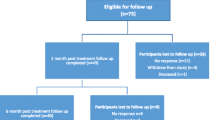Abstract
This study evaluated the effects of several psychological factors on postsurgical recovery while controlling for and also evaluating the effects of the physical trauma induced by the surgery. Subjects were 38 patients (18 males and 20 females) who were scheduled to have four third molars surgically removed. The psychological factors measured included anxiety and expectations about recovery, trait anxiety, coping behaviors, and health locus of control. Surgical trauma was rated after surgery, and the following aspects of recovery were monitored: postoperative pain, interference with normal function, swelling, and healing. Poorer postoperative recovery was significantly predicted by each of the psychological variables and by higher levels of surgical trauma. In addition, the effects of the psychological variables on recovery were shown to be largely independent of the trauma effects. The data suggest that (a) future studies which give patients more positive expectations and reduce their anxiety about recovery may improve their recovery and (b) the types of patients most in need of preoperative psychological support would be those who have higher trait anxiety, vigilant coping behaviors, or an internal locus of control.
Similar content being viewed by others
References
Auerbach, S. M. (1973). Trait-state anxiety and adjustment to surgery.J. Consult. Clin. Psychol. 40: 264–271.
Auerbach, S. M., Kendall, P. C., Cuttler, H. F., and Levitt, N. R. (1976). Anxiety, locus of control, type of preparatory information, and adjustment to dental surgery.J. Consult. Clin. Psychol. 44: 809–818.
Cohen, F., and Lazarus, R. S. (1973). Active coping processes, coping dispositions, and recovery from surgery.Psychosom. Med. 35: 375–389.
Cox, T. (1978).Stress, University Park Press, Baltimore.
Egbert, L. D., Battit, G. E., Welch, C. E., and Bartlett, M. K. (1964). Reduction of postoperative pain by encouragement and instruction of patients: A study of doctorpatient rapport.N. Engl. J. Med. 270: 825–827.
Flaherty, G. G., and Fitzpatrick, J. J. (1978). Relaxation technique to increase comfort of postoperative patients.Nursing Res. 27: 352–355.
Holmes, T. H., and Masuda, M. (1974). Life change and illness susceptibility. In Dohrenwend, B. S., and Dohrenwend, B. P. (eds.),Stressful Life Events: Their Nature and Effects, John Wiley and Sons, New York.
Janis, I. L. (1958).Psychological Stress, John Wiley and Sons, New York.
Johnson, J. E., Dabbs, J. M., and Leventhal, H. (1970). Psychosocial factors in the welfare of surgical patients.Nursing Res. 19: 18–28.
Johnson, J. E., Leventhal, H., and Dabbs, J. M. (1971). Contribution of emotional and instrumental response processes in adaptation to surgery.j. Personal. Soc. Psychol. 20: 55–64.
Kimball, C. P. (1969). Psychological responses to the experience of open heart surgery. I.Am. J. Psychiat. 126: 3.
Kolouch, F. T. (1962). Role of suggestion in surgical convalescence.Arch. Surg. 85: 304–315.
Langer, E. J., Janis, I. L., and Wolfer, J. A. (1975). Reduction of psychological stress in surgical patients.J. Exp. Soc. Psychol. 11: 155–165.
Lazarus, R. S. (1966).Psychological Stress and the Coping Process, McGraw-Hill, New York.
Matinez-Urrutia, A. (1975). Anxiety and pain in surgical patients.J. Consult. Clin. Psychol. 43: 437–442.
Mason, R. C., Clark, G., Reeves, R. B., and Wagner, B. (1969). Acceptance and healing.J. Religion Health 8: 123–142.
Schmitt, F. E., and Woldridge, P. J. (1973). Psychological preparation of surgical patients.Nursing Res. 22: 108–116.
Shipley, R. H., Butt, J. H., Horwitz, B., and Farbry, J. E. (1978). Preparation for a stressful medical procedure: Effect of amount of stimulus preexposure and coping style.J. Consult. clin. Psychol. 46: 499–507.
Wallston, B. S., Wallston, K. A., Kaplan, G. D., and Maides, S. A. (1976). Development and validation of the Health Locus of Control (HLC) Scale.J. Consult. Clin. Psychol. 44: 580–585.
Weiss, S. M. (1966). Psychological adjustment following open-heart surgery.J. Nerv. Ment. Dis. 143: 363–368.
Wolfer, J. A., and Davis, C. E. (1970). Assessment of surgical patients' preoperative emotional condition and postoperative welfare.Nursing Res. 19: 402–414.
Author information
Authors and Affiliations
Additional information
This research was supported by NIH Research Grants DE-02668 and RR-05333 and by a Pfeiffer Foundation Fellowship.
Rights and permissions
About this article
Cite this article
George, J.M., Scott, D.S., Turner, S.P. et al. The effects of psychological factors and physical trauma on recovery from oral surgery. J Behav Med 3, 291–310 (1980). https://doi.org/10.1007/BF00845053
Accepted:
Issue Date:
DOI: https://doi.org/10.1007/BF00845053




